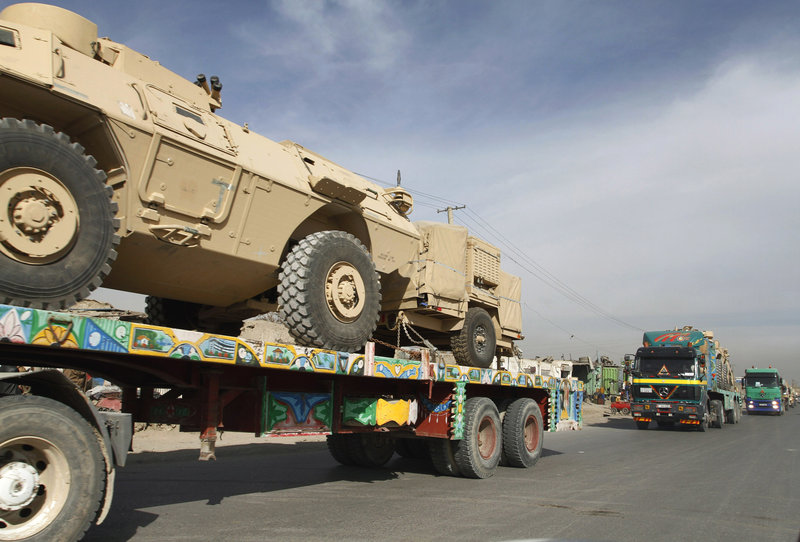WASHINGTON — After examining hundreds of combat support and reconstruction contracts in Afghanistan, the U.S military estimates $360 million in U.S. tax dollars has ended up in the hands of people the American-led coalition has spent nearly a decade battling: the Taliban, criminals, and power brokers with ties to both.
The losses underscore the challenges the U.S. and its international partners face in overcoming corruption in Afghanistan. A central part of the Obama administration’s strategy has been to award U.S.-financed contracts to Afghan businesses to help improve quality of life and stoke the country’s economy.
But until a special task force assembled by Gen. David Petraeus began its investigation last year, the coalition had little visibility into the connections many Afghan companies and their vast network of subcontractors had with insurgents and criminals – groups military officials call “malign actors.”
In a process called “reverse money laundering,” payments from the U.S. pass through companies hired by the military for transportation, construction, fuel and other services to firms and individuals with ties to the insurgency or criminal networks, according to interviews and task force documents obtained by the AP.
“Funds begin as clean monies,” according to one document, then “either through direct payments or through the flow of funds in the subcontractor network, the monies become tainted.”
The conclusions by Task Force 2010 represent the most definitive assessment of how U.S. military spending and aid to Afghanistan has been diverted to the enemy or stolen. Only a small percentage of the $360 million has been garnered by the Taliban and insurgent groups, said a senior U.S. military official in Kabul. The bulk of the money was lost to profiteering, bribery and extortion by criminals and power brokers, said the official, who declined to provide a specific breakdown.
The official requested anonymity to discuss the task force’s ongoing probe of the movement of U.S. contract money in Afghanistan. The documents obtained by AP provide an overview of the task force’s work.
Overall, the $360 million represents a fraction of the $31 billion in active U.S. contracts that the task force reviewed. But insurgents rely on crude weaponry and require little money to operate. And the illicit gains buttress what the International Crisis Group, a Brussels-based think tank, referred to in a June report as a “nexus between criminal enterprises, insurgent networks and corrupt political elites” in Afghanistan.
More than half the losses flowed through a transportation contract called Host Nation Trucking, the official said. Eight companies served as prime contractors and hired nearly 36 subcontractors for vehicles and convoy security to ship huge amounts of food, water, fuel and ammunition to American troops stationed at bases across Afghanistan.
The Defense Department announced Monday that it had selected 20 separate contractors for a new transportation contract potentially worth $983.5 million to replace Host Nation Trucking. Officials said the new arrangement will reduce the reliance on subcontractors.
Under the new National Afghan Trucking Services contract, the military will be able to choose from a deeper pool of companies competing against one another to offer the best price to move supplies. The arrangement also gives the U.S. more flexibility in determining whether security is needed for supply convoys and who should provide it, according to a description of the contract.
The Pentagon did not provide the names of the 20 companies picked, due to worries that larger contractors who weren’t selected might try to coerce them into a takeover, the senior defense official said. None of the eight prime contractors affiliated with the Host Nation Trucking contract are part of the new arrangement, the official added.
HEB International Logistics of Dubai, a Host Nation Trucking prime contractor, “made payments directly to malign actors,” one of the task force documents reads.
In 2009 and 2010, an HEB subcontractor identified in the document only as “Rohullah” received $1.7 million in payments. A congressional report issued last year said Rohullah is a warlord who controlled the convoy security business along the highway between Kabul and Kandahar, the two largest cities in Afghanistan.
Half a dozen attempts to reach officials at HEB’s offices in Dubai by telephone were unsuccessful due to calls being transferred and lines going dead. It is also the holy month of Ramadan, when many employees work shortened days and offices close early.
The task force also said contractors engaged in profiteering by forming dummy companies.
Send questions/comments to the editors.



Success. Please wait for the page to reload. If the page does not reload within 5 seconds, please refresh the page.
Enter your email and password to access comments.
Hi, to comment on stories you must . This profile is in addition to your subscription and website login.
Already have a commenting profile? .
Invalid username/password.
Please check your email to confirm and complete your registration.
Only subscribers are eligible to post comments. Please subscribe or login first for digital access. Here’s why.
Use the form below to reset your password. When you've submitted your account email, we will send an email with a reset code.